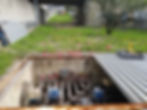UTILITY ENGINEERING




As a task discipline of civil engineering, Utility Engineering (UE) includes all aspects of any given civil engineering design or construction project pertaining specifically to utilities:
-
Utility Investigation
-
Conflict Analysis
-
Conflict Resolution Engineering Including Utility Design
-
Utility Adjustments
-
Protect-in-Place or Relocation Design
-
Asset Management Including Accommodation Policies, Statutory Mandates, and Agreements
-
Installation and Inspection
-
Bid and Contract Management
-
Construction Staging
-
Utility Related Value Engineering
-
Construction Management
-
Condition Assessment Utility Coordination Between Multiple Parties
-
Pipeline, Cable and Conduit Project Planning, Design, and Construction
ECHO does not provide utility design, but rather focuses on a specific aspect of Utility Engineering - Subsurface Utility Engineering (SUE). This service includes investigating the location of existing utilities within the project limits and providing the Project Owner, Engineer, and Contractor with reliable utility information to enhance the success of any project.


SUBSURFACE UTILITY ENGINEERING
Subsurface Utility Engineering (SUE) relates to the collection and depiction of existing subsurface utility data. With the use and adoption of surface geophysics, field investigation, verification and survey, existing subsurface utilities can be found, studied, depicted and analyzed for any civil engineering project.
Obtaining advanced and accurate information on the existing subsurface utilities located within certain project limits is beneficial to better design, make informed decisions on how to deal with existing utilities, mitigate risk and avoid delays during construction.
Depending on the specific project, the utility information can be conveyed in a variety of electronic and hard copy formats.
The American Society of Civil Engineering (ASCE) Utility Engineering & Surveying Institute (UESI) and Construction Institute (CI) released the 38-22 “Standard Guideline for Investigating and Documenting Existing Utilities” which provides prescriptive and performance guidelines to achieve Utility Quality Levels information and describe the significant professional judgment exercised by the professional to determine appropriate timing, sequencing, location, and scope of a utility investigative effort to achieve the goal of reduced utility issues during project delivery. ECHO has the staff, experience, and capabilities to perform any utility investigative work, in accordance with the ASCE Standard, or as requested by the specific project.
